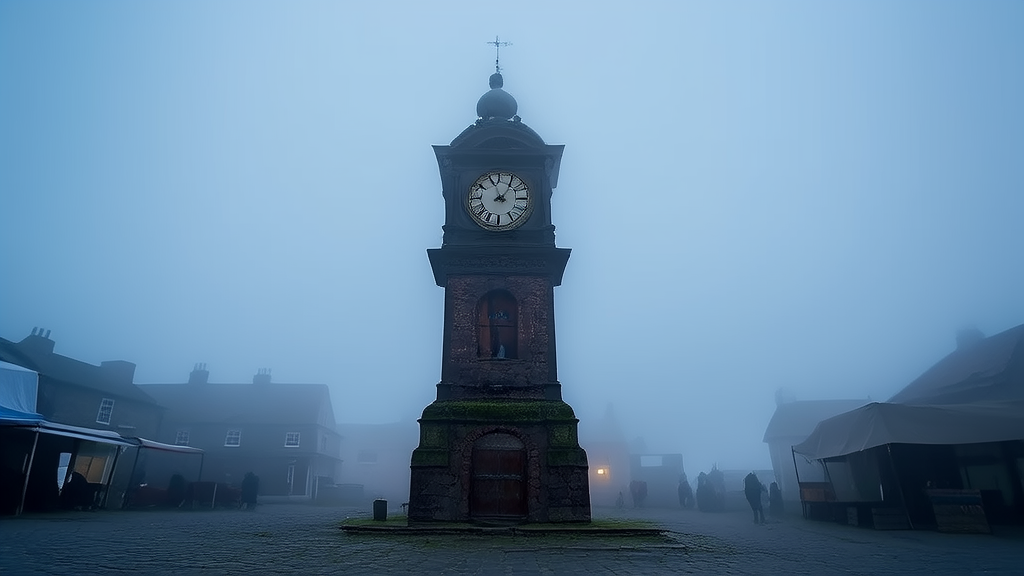🔮 Weird Tales & Urban Legends
The Forgotten Clock Tower and the Mysterious Ticking at 3:17

The old clock tower in the heart of the village had stood for over two centuries, its gears rusted and its hands frozen at 3:17. No one knew exactly when it had stopped, but the villagers whispered that it had once ticked with perfect precision. They called it "the Watcher," a relic of a time when time itself seemed to move more slowly.
Every morning, the townspeople would pass by the tower, sometimes pausing to glance at its broken face. Some claimed they heard faint ticking, though no one could confirm it. Others said the shadows around the tower stretched longer than they should, as if time itself was bending. The children were warned not to linger near it, but the curiosity of youth was hard to quell.
One day, a young woman named Elara, an outsider who had come to study the village’s folklore, decided to investigate. She had read about the clock tower in old manuscripts, which spoke of strange occurrences—people waking up in different years, echoes of conversations that hadn’t been spoken yet, and clocks that ran backward without explanation.
Elara arrived on a misty morning, the air thick with the scent of damp earth and forgotten things. She approached the tower, her boots crunching against the gravel path. As she reached the base, the temperature dropped sharply. A chill ran down her spine, though it wasn’t from the cold—it was something else, something deeper.
She climbed the creaking stairs, each step echoing like a heartbeat. At the top, the door creaked open on its own, revealing a narrow room filled with dust and silence. The walls were lined with dusty books and maps, some of which depicted places that didn’t exist on any modern map. In the center of the room stood a small, ornate clock, its face cracked but still intact. It showed the same time as the tower below—3:17.
As she reached out to touch it, the air shimmered. The room shifted, and suddenly, she was no longer alone. A man in a long coat stood beside her, his face obscured by shadow. He spoke in a voice that echoed from all directions.
"You shouldn’t be here," he said. "Time is not meant to be tampered with."
Elara stumbled back, her breath catching. "Who are you?"
"I am what remains of those who came before you," he replied. "I have watched this place for centuries, waiting for someone to understand."
He gestured to the clock. "This is not just a timepiece. It is a gate. A bridge between moments. Those who touch it are pulled into the currents of time, never quite belonging to any one moment."
Before she could ask more, the room began to blur. The walls dissolved into swirling colors, and she felt herself being pulled through something vast and unseen. When she opened her eyes, she was standing in a different version of the village. The buildings were older, the people dressed in clothes from a century earlier. A child laughed nearby, and the sound was both familiar and foreign.
She tried to find her way back, but every path led to another time. She saw herself in different ages—childhood, adulthood, old age—each version of her living a different life. She met versions of people she knew, some kind, others cruel. Time had become a river, and she was lost in its flow.
After what felt like days, she finally found the tower again, but now it stood in a field of ruins. The clock was gone, and the air was heavy with the weight of forgotten years. She sat on the ground, overwhelmed by the realization that time was not linear, but a web of possibilities, and she had touched only a fraction of it.
When she returned to the present, the tower was still there, but now it seemed different. The villagers no longer spoke of it, as if it had never existed. The only proof of her journey was the strange mark on her wrist—a symbol she had seen on the old manuscripts, the same one that adorned the clock's face.
She never spoke of what she had seen, but sometimes, when the wind blew just right, she swore she could hear the faint ticking of a clock that no longer existed. And in the stillness of the night, she wondered if she had truly returned—or if she had simply stepped into another version of herself, forever wandering between moments.
Published on en
🔗
Related Sites
- AI Blog — AI trends and tech news